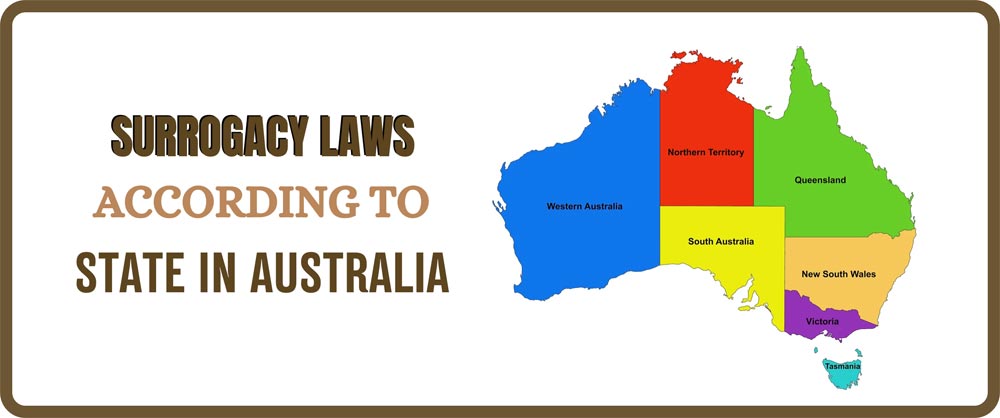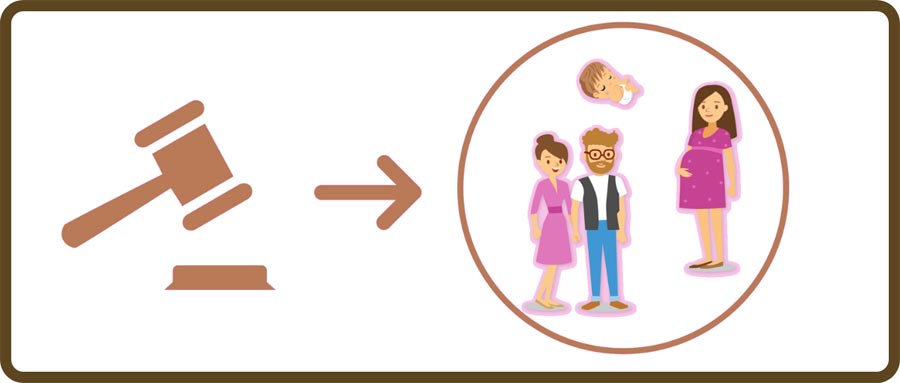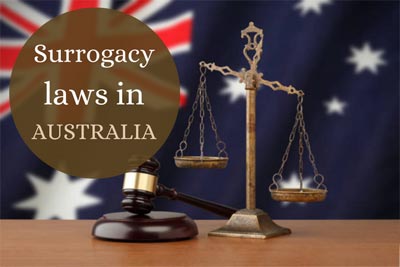 State-by-state variations exist in Australia’s surrogacy laws. So, as you go through with your surrogacy aspirations in the country, you need to keep this aspect in mind. That said, one should remember that most states still permit altruistic surrogacy in Australia and you cannot pay the surrogate mother more than her expenses during the surrogacy program.
State-by-state variations exist in Australia’s surrogacy laws. So, as you go through with your surrogacy aspirations in the country, you need to keep this aspect in mind. That said, one should remember that most states still permit altruistic surrogacy in Australia and you cannot pay the surrogate mother more than her expenses during the surrogacy program.
If you’re wondering is surrogacy legal in Australia, the answer depends on which state you are in, as laws vary, but altruistic surrogacy is generally permitted across most regions.
On the other side, having an in-depth understanding of surrogacy laws in Australia is a prerequisite in case you are exploring the possibility of realizing your parenthood dreams in this part of the world. Understanding the surrogacy process in Australia step-by-step is equally important to ensure legal and emotional readiness for intended parents.
While our legal counselors at the Surrogacy agency Kenya will simplify all these laws for surrogacy in Australia for you, here is a detailed analysis on a state to state basis regarding the same.
Definition of Surrogacy laws in Australia from the intended parent’s perspective!
In layman’s language, surrogacy is a state subject in Australia i.e. every state comes along with its own rules and regulations in the same regard. For instance, according to Western Australian surrogacy law, both parties must sign a legally binding “Surrogacy Arrangement” before a voluntary surrogacy agreement can be made with a gestational carrier.
Eligibility for surrogacy according to Australia surrogacy law
 Even though surrogacy is a state subject in Australia, there are few guidelines in regard to ‘who can pursue and partake in surrogacy in Australia’.
Even though surrogacy is a state subject in Australia, there are few guidelines in regard to ‘who can pursue and partake in surrogacy in Australia’.
- The intended parents must be unable to conceive or carry a child on their own or, even if they could, carrying a child on their own would be risky for them due to a social or medical need for surrogacy.
- According to surrogacy laws in Australia, Throughout the entire pregnancy, the surrogate mother retains her bodily autonomy and independence in Australia.
- Although the partners will have agreements in place regarding pregnancy and birth arrangements, the surrogate will have the final say in decisions involving her own body
- Only altruistic purposes may be stated in the surrogacy contract. In addition to the fact that commercial surrogacy is illegal in all states and territories of Australia, surrogates have incredible experiences giving birth and delivering the child to the intended parents. As a result, it is prohibited for surrogates and their partners to be paid for carrying another person’s child.
- Being a surrogate is a noble endeavor, but all costs associated with the pregnancy and delivery must be covered by the intended parents.
- In the state where the child was born, the surrogate and her partner are listed as the child’s parents on the birth certificate.
- Following the birth of the child, the intended parents may submit a Parentage Order application in the state where they currently reside. The Order states that the intended parents now have legal custody of the child, and the child’s birth parents no longer have that responsibility.
Any woman who wants to become pregnant must seek independent legal counsel before trying to conceive in any state. The birth certificate’s original surrogate and her partner are deleted, and a new one is created with the names of the new parents. Agreements for gestational surrogacy and traditional surrogacy are both covered by this rule.
Australia’s surrogacy laws vary from state to state.
If you are coming up with the question- is surrogacy legal in Australia, you must know that this procedure is administered at the state level in the country. There are no surrogacy laws in Australia currently in effect in the Northern Territory. However, laws in South Australia and Victoria have already changed, and Western Australia is about to follow suit.
Surrogates typically have aged over 25. Furthermore, in Queensland, New South Wales, or South Australia, a surrogate does not have to be a mother herself to be a surrogate mother. On the other side, the intended parents in Tasmania tend to favor surrogates who are natives.
In Victoria and Western Australia, intended parents are required to use a surrogate who has already given birth, barring unusual circumstances. For the question-Is surrogacy legal in Australia? the answer is yes. Surrogacy is legal across most of Australia. That said, understanding the surrogacy process in Australia is just as important, as each state may have specific legal and procedural requirements.
Western Australia’s surrogacy laws
A voluntary surrogacy arrangement cannot be entered into in Western Australia without agreements being completed and signed by both the intended parent and the carrier. Additionally, a contract must fulfill the following conditions in order to be valid:
In order to qualify, a surrogate mother in Australia must be at least 25 years old and have already given birth to a child.
- The Agreement must be in writing and signed by both Parties.
- Counseling and legal assistance were provided to all parties.
- Before the surrogate can become pregnant, the deal must be approved by the Reproductive Technology Council, and the parties must undergo a medical examination to determine whether they are eligible to be the parents of a child born via a surrogate. Prior to becoming pregnant, the surrogate must have the agreement in place.
- You can arrange a free consultation with a family law expert.

Surrogacy laws in Queensland
Queensland’s Surrogacy Act 2010, which was passed in 2010, governs surrogacy contracts within the state. According to the law, anyone who satisfies the following requirements may enter a surrogacy arrangement:
- The surrogate, the intended parents, and their partner must all be at least 25 years old.
- Counseling and legal advice must have been provided to all parties.
- Gestational surrogacy is the only form of surrogacy allowed, and the intended parents must reside in Queensland. Any and all commercial agreements are forbidden.
Surrogacy laws in south Australia
The 1975 Family Relationships Act, which received approval from the Australian Ministry of Health, set forth the surrogacy laws for South Australia. The following requirements must be met in order to enter a surrogacy arrangement legally:
- Everyone, including the intended parents who are not pregnant, has received legal counseling.
- the intended parents, the intended surrogate, and their partner are all adults of at least 25 years of age
- South Australia must be the intended parents’ home state.
- If the intended mother were to become personally pregnant, there must be a significant risk that the child would inherit a genetic disorder, disease, or illness. Additionally, the intended parents must be genetically related to the child. A lawyer must also sign, date, and attest to the agreement’s written form.
- Although it is not illegal to include advertisements, the arrangement cannot have a commercial purpose.
Surrogacy laws in Tasmania
The Surrogacy Act 2012 specifies the procedures for surrogacy in Tasmania. A person may enter into a surrogacy agreement if they satisfy the requirements listed below in accordance with the surrogacy laws of Australia applicable to this state:
 The surrogate mother must be at least 25 years old and have at least one living child as of the time of the transfer.
The surrogate mother must be at least 25 years old and have at least one living child as of the time of the transfer.- Have a valid Tasmanian address at the time of birth. Furthermore, both parents must be older than 21.
- Each party has received counseling and legal assistance.
- Both parties have signed a written agreement outlining the terms of the partnership.
- A surrogacy arrangement is required due to social or physiological factors.
- The contract must be of a non-commercial nature and only gestational surrogacy is allowed in this circumstance.
Surrogacy laws in Victoria
The Assisted Reproductive Treatment Act 2008, which was passed in 2008, sets the regulations for surrogacy in Victoria. According to the law, anyone who satisfies the following requirements may enter a surrogacy arrangement:
The intended mother is unlikely to become pregnant, neither the baby nor the mother’s life would be in danger if the surrogate carrying the pregnancy, and all parties have undergone counseling. The agreement must not have a commercial purpose, and neither party may use the agreement for any other purpose.
The situation of other states in regard to Australian surrogacy law
Surrogacy is not permitted in the Northern Territory due to a lack of legislation. Moreover, in the Australian Capital Territory, the following conditions must be satisfied in order to enter into a non-commercial surrogacy arrangement:
- The intended parents must live in the Australian Capital Territory, be at least 25 years of age, and be the surrogate’s legal guardians.
- Under ACT agreements, any compensation given to an Australian surrogate mother must be used only to cover pregnancy-related costs.
- Posting ads looking for a surrogate is prohibited for both intended parents and those looking to be surrogates.
In New South Wales, the Surrogacy Act 2010, which was passed in 2010, specifies the surrogacy process in Australia. A surrogacy agreement cannot be signed before the following requirements have been satisfied, per the law:
- Money may only be paid to cover pregnancy-related expenses and any problems encountered during the arrangement; it may not be paid for the purpose of gaining a commercial advantage.
- A surrogate mother can only be used to carry a child if she has no genetic connection to the child, and both the intended parents and the surrogate are at least 25 years old and live in New South Wales.
- As long as no fee has been paid for the ad, parties interested in adopting children or becoming parents are allowed to post advertisements.
Taking detailed know-how of these laws may sound hectic, still, it holds utmost importance towards the overall success of your surrogacy program. This is where you need someone that comes along with all the right experience and expertise to your support you.
Surrogacy agency Kenya: Your legal partner at every step of your surrogacy journey!
With so many variations in surrogacy laws in Australia, you may feel anxious or troubled at times. Well, you must not as here at surrogacy agency Kenya, we are committed to offering you customized surrogacy plans right as per your needs and requirements. All you got to do is connect with one of our coordinators to get started!

No Comments